Items filtered by date: May 2023
Poor Circulation of the Feet
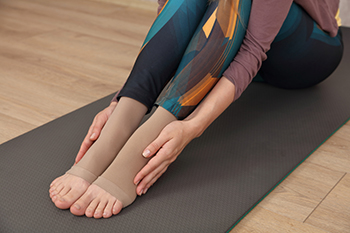
Poor blood circulation can cause the feet to feel cold, numb, or tingly. It can also cause dry skin on the feet and brittle toenails. This happens because there is an interference with blood delivery of vital oxygen and nutrients to the feet. Poor circulation can make wounds heal slower and increase the risk of infection. Lifestyle changes may help some patients, and others may have to take medicine to widen blood vessels. Though vitamins and supplements cannot cure circulation problems, they may provide relief from symptoms. If you have signs of poor circulation in your feet, it is strongly suggested that you visit a podiatrist as quickly as possible who can determine what the cause is, and offer advice on treatment.
While poor circulation itself isn’t a condition; it is a symptom of another underlying health condition you may have. If you have any concerns with poor circulation in your feet contact one of our podiatrists of Pennsylvania. Our doctors will treat your foot and ankle needs.
Poor Circulation in the Feet
Peripheral artery disease (PAD) can potentially lead to poor circulation in the lower extremities. PAD is a condition that causes the blood vessels and arteries to narrow. In a linked condition called atherosclerosis, the arteries stiffen up due to a buildup of plaque in the arteries and blood vessels. These two conditions can cause a decrease in the amount of blood that flows to your extremities, therefore resulting in pain.
Symptoms
Some of the most common symptoms of poor circulation are:
- Numbness
- Tingling
- Throbbing or stinging pain in limbs
- Pain
- Muscle Cramps
Treatment for poor circulation often depends on the underlying condition that causes it. Methods for treatment may include insulin for diabetes, special exercise programs, surgery for varicose veins, or compression socks for swollen legs.
As always, see a podiatrist as he or she will assist in finding a regimen that suits you. A podiatrist can also prescribe you any needed medication.
If you have any questions, please feel free to contact one of our offices located in Plymouth Meeting and Ambler, PA . We offer the newest diagnostic and treatment technologies for all your foot care needs.
Which Type of Arthritis Do I Have?
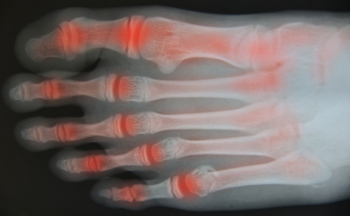
The ankles and feet are responsible for the body’s mobility. Arthritis can affect the joints and range of motion may be limited, as a result of the pain arthritis can cause. There are several kinds of arthritis, and there are a few types that can affect the feet. A degenerative form of arthritis is known as osteoarthritis, or OA, and it tends to happen to people who are middle-aged. A common symptom of the autoimmune disease that is referred to as rheumatoid arthritis, or RA, may lead to incurring a foot deformity, and it is often difficult to walk. An injury may cause post-traumatic arthritis to develop, which causes the cartilage to gradually wear away. Many patients have symptoms of arthritis that can consist of swelling, tenderness, and there may be pain while moving the foot. When the feet are affected by arthritis, patients may lose their sense of balance. If you have foot pain, it is suggested that you consult with a podiatrist who can determine if arthritis is present, and offer you correct treatment solutions.
Arthritis can be a difficult condition to live with. If you are seeking treatment, contact one of our podiatrists from Pennsylvania. Our doctors can provide the care you need to keep you pain-free and on your feet.
Arthritic Foot Care
Arthritis is a term that is commonly used to describe joint pain. The condition itself can occur to anyone of any age, race, or gender, and there are over 100 types of it. Nevertheless, arthritis is more commonly found in women compared to men, and it is also more prevalent in those who are overweight. The causes of arthritis vary depending on which type of arthritis you have. Osteoarthritis for example, is often caused by injury, while rheumatoid arthritis is caused by a misdirected immune system.
Symptoms
- Swelling
- Pain
- Stiffness
- Decreased Range of Motion
Arthritic symptoms range in severity, and they may come and go. Some symptoms stay the same for several years but could potentially get worse with time. Severe cases of arthritis can prevent its sufferers from performing daily activities and make walking difficult.
Risk Factors
- Occupation – Occupations requiring repetitive knee movements have been linked to osteoarthritis
- Obesity – Excess weight can contribute to osteoarthritis development
- Infection – Microbial agents can infect the joints and trigger arthritis
- Joint Injuries – Damage to joints may lead to osteoarthritis
- Age – Risk increases with age
- Gender –Most types are more common in women
- Genetics – Arthritis can be hereditary
If you suspect your arthritis is affecting your feet, it is crucial that you see a podiatrist immediately. Your doctor will be able to address your specific case and help you decide which treatment method is best for you.
If you have any questions, please feel free to contact one of our offices located in Plymouth Meeting and Ambler, PA . We offer the newest diagnostic and treatment technologies for all your foot care needs.
How Did I Get a Blister on My Foot?
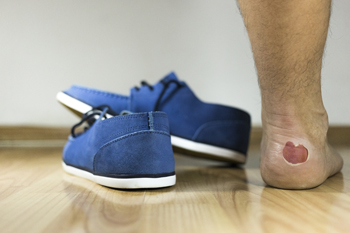
Blisters on the feet can cause extreme discomfort. They form as a result of having a portion of damaged skin, which is generally caused by excess friction. They are defined as a small area that is filled with liquid, which helps to protect the raw skin. The majority of people who develop blisters on their feet understand the importance of keeping them from popping prematurely, and this can be difficult while wearing shoes. The blister will gradually drain when new skin has formed, and the ease of completing daily activities can return. It is beneficial to implement prevention techniques that can help to avoid blisters. These can include wearing shoes and socks that fit correctly, and wearing sunscreen, which can protect the skin. Blisters may also develop if the feet are exposed to extreme cold or excessive heat, or possibly from an allergic reaction to an insect bite. If you have a blister on your foot, it is suggested that you confer with a podiatrist for additional tips on how to treat and prevent foot blisters from developing.
Blisters are prone to making everyday activities extremely uncomfortable. If your feet are hurting, contact one of our podiatrists of Pennsylvania. Our doctors can provide the care you need to keep you pain-free and on your feet.
Foot Blisters
Foot blisters develop as a result of constantly wearing tight or ill-fitting footwear. This happens due to the constant rubbing from the shoe, which can often lead to pain.
What Are Foot Blisters?
A foot blister is a small fluid-filled pocket that forms on the upper-most layer of the skin. Blisters are filled with clear fluid and can lead to blood drainage or pus if the area becomes infected.
How Do Blisters Form?
Blisters on the feet are often the result of constant friction of skin and material, usually by shoe rubbing. Walking in sandals, boots, or shoes that don’t fit properly for long periods of time can result in a blister. Having consistent foot moisture and humidity can easily lead to blister formation.
Prevention & Treatment
It is important to properly care for the affected area in order to prevent infection and ease the pain. Do not lance the blister and use a Band-Aid to provide pain relief. Also, be sure to keep your feet dry and wear proper fitting shoes. If you see blood or pus in a blister, seek assistance from a podiatrist.
If you have any questions, please feel free to contact one of our offices located in Plymouth Meeting and Ambler, PA . We offer the newest diagnostic and treatment technologies for all your foot care needs.
Do Your Child's Feet Hurt?
Is My Heel Pain Plantar Fasciitis?
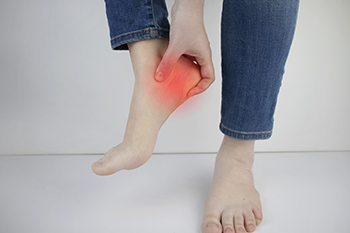
One of the most common foot problems is plantar fasciitis. It is an inflammation of the plantar fascia, which is the band of tissue that is found on the sole of the foot. It connects the heel to the toes, and it can become inflamed for various reasons. These include standing on hard or uneven surfaces for long periods of time or wearing shoes that have inadequate heel support. It can also happen from the aging process that may gradually wear down the heel pad. Some people endure an injury that can tear the plantar fascia, including a sudden fall, repetitive cycling, or frequent participation in running or jumping activities. Plantar fasciitis can be a common condition among people who are overweight, which may cause the fat pads to prematurely flatten as a result of the added weight the feet must carry. If you have pain in your heel or arch area, it is strongly suggested that you consult a podiatrist who can accurately diagnose the condition and offer the correct treatment options.
Plantar fasciitis is a common foot condition that is often caused by a strain injury. If you are experiencing heel pain or symptoms of plantar fasciitis, contact one of our podiatrists from Pennsylvania. Our doctors can provide the care you need to keep you pain-free and on your feet.
What Is Plantar Fasciitis?
Plantar fasciitis is one of the most common causes of heel pain. The plantar fascia is a ligament that connects your heel to the front of your foot. When this ligament becomes inflamed, plantar fasciitis is the result. If you have plantar fasciitis you will have a stabbing pain that usually occurs with your first steps in the morning. As the day progresses and you walk around more, this pain will start to disappear, but it will return after long periods of standing or sitting.
What Causes Plantar Fasciitis?
- Excessive running
- Having high arches in your feet
- Other foot issues such as flat feet
- Pregnancy (due to the sudden weight gain)
- Being on your feet very often
There are some risk factors that may make you more likely to develop plantar fasciitis compared to others. The condition most commonly affects adults between the ages of 40 and 60. It also tends to affect people who are obese because the extra pounds result in extra stress being placed on the plantar fascia.
Prevention
- Take good care of your feet – Wear shoes that have good arch support and heel cushioning.
- Maintain a healthy weight
- If you are a runner, alternate running with other sports that won’t cause heel pain
There are a variety of treatment options available for plantar fasciitis along with the pain that accompanies it. Additionally, physical therapy is a very important component in the treatment process. It is important that you meet with your podiatrist to determine which treatment option is best for you.
If you have any questions, please feel free to contact one of our offices located in Plymouth Meeting and Ambler, PA . We offer the newest diagnostic and treatment technologies for all your foot care needs.
Sports Podiatrists
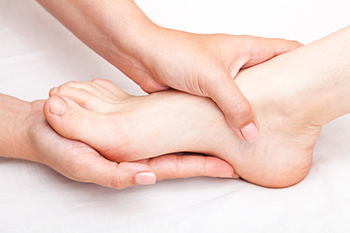
Podiatrists are foot specialists that are specially trained in addressing different afflictions of the feet. They are trusted medical professionals who can treat a range of various foot conditions, from plantar fasciitis to hammertoe. It is important to note there are different types of podiatrists who may specialize in specific areas in the field of podiatry. For example, one such kind of podiatrist is known as a sports podiatrist. As the name suggests, this type of podiatrist works primarily with athletes and those who engage in sports. A sports podiatrist is well-versed in understanding, recognizing, and treating the nuances of foot injuries in the context of sports. Some of these sports podiatrists are engaged in producing research in their field. These podiatrists are easily able to identify the foot afflictions that most affect athletes. To learn more about the different types of podiatrists available to help you address any foot problems, it is suggested that you schedule an appointment with a podiatrist today.
If you are experiencing pain in the feet or ankles, don’t join the stubborn majority refusing treatment. Feel free to contact one of our podiatrists from Pennsylvania. Our doctors can provide the care you need to keep you pain-free and on your feet.
What Is a Podiatrist?
Someone would seek the care of a podiatrist if they have suffered a foot injury or have common foot ailments such as heal spurs, bunions, arch problems, deformities, ingrown toenails, corns, foot and ankle problems, etc.
Podiatric Treatment
A podiatrist will treat the problematic areas of the feet, ankle or lower leg by prescribing the following:
- Physical therapy
- Drugs
- Orthotic inserts or soles
- Surgery on lower extremity fractures
A common podiatric procedure a podiatrist will use is a scanner or force plate which will allow the podiatrist to know the designs of orthotics. Patients are then told to follow a series of tasks to complete the treatment. The computer will scan the foot a see which areas show weight distribution and pressure points. The podiatrist will read the analysis and then determine which treatment plans are available.
If you have any questions please feel free to contact one of our offices located in Plymouth Meeting and Ambler, PA . We offer the newest diagnostic and treatment technologies for all your foot and ankle needs.

